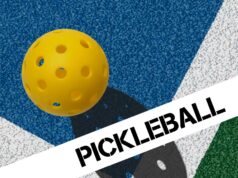Pickleball is a fun, fast-paced sport that combines elements of tennis, badminton, and ping-pong. It’s easy to learn, inclusive for all ages and skill levels, and can be played indoors or outdoors. Whether you’re a beginner or just curious about the game, here’s a simple guide to the rules and how to start playing pickleball.
What You Need to Play
- Court: A pickleball court is 20 feet wide and 44 feet long, the same size as a doubles badminton court. It has a net in the middle, similar to tennis but lower (36 inches at the sides, 34 inches in the center), perfect for learning how to play pickleball.
- Paddle: Pickleball paddles are larger than ping-pong paddles but smaller than tennis rackets. They’re usually made of wood, graphite, or composite materials.
- Ball: The ball is lightweight, plastic, and has holes, like a wiffle ball. Indoor and outdoor balls have slightly different hole patterns.
- Players: Pickleball can be played as singles (1 vs. 1) or doubles (2 vs. 2).
Basic Rules of Pickleball
- Serving:
- The serve must be underhand, and the paddle must contact the ball below your waist.
- The serve is made diagonally, starting from the right-hand side of the court.
- Only the serving team can score points in pickleball.
- Double Bounce Rule:
- After the serve, the ball must bounce once on the receiving side before players start to play pickleball.
- The serving team must also let the return bounce before hitting it.
- After these two bounces, players can volley (hit the ball in the air) or let it bounce.
- Non-Volley Zone (The Kitchen):
- The kitchen refers to the area 7 feet from the net on both sides.
- Players cannot volley (hit the ball in the air) while standing in this zone.
- You can enter the kitchen to hit a ball that has bounced.
- Scoring:
- Games typically end when a player reaches 11 points, with a required 2-point margin to win.
- Only the serving team can score points in the game.
- In doubles, both players on a team get a chance to serve before the serve switches to the other team when you are learning the basics of how to play pickleball.
- Faults:
- Hitting the ball out of bounds.
- Not clearing the net.
- Volleying from the kitchen.
- Stepping into the kitchen while volleying.
- Failing to follow the double bounce rule.
How to Play Step-by-Step
- Start the Game: Decide who serves first (usually by a coin toss).In a standard pickleball match, players always make the first serve from the right-hand side.
- Serve the Ball: Serve underhand diagonally to the opposite court. The ball must land in the correct service box to follow the rules of pickleball play.
- Return the Ball: The receiving team lets the ball bounce once and returns it. The serving team must also let it bounce before hitting it back.
- Rally: After the two bounces, players can volley or let the ball bounce. Keep the ball in play until a fault occurs while playing pickleball.
- Score Points: Only the serving team can score. Switch sides after each point as you learn step-by-step how to play pickleball.
- Win the Game: The first team to reach 11 points (and lead by 2 points) wins.
Tips for Beginners
- Stay Out of the Kitchen: Avoid volleying near the net to prevent faults in your pickleball gameplay.
- Communicate in Doubles: Talk to your partner about who will take the ball while practicing how to play pickleball together.
- Practice Serves: A good serve sets the tone for the rally when engaging in pickleball.
- Have Fun: Pickleball is about enjoyment and staying active, so don’t stress too much about winning.
Why Pickleball is Great for Everyone
Pickleball is easy to learn, social, and low-impact, making it perfect for all ages and fitness levels. It’s a great way to stay active, meet new people, and have fun. Whether you’re playing competitively or just for fun, pickleball offers something for everyone.
So grab a paddle, find a court, and learn how to play pickleball! You’ll get hooked in no time.















